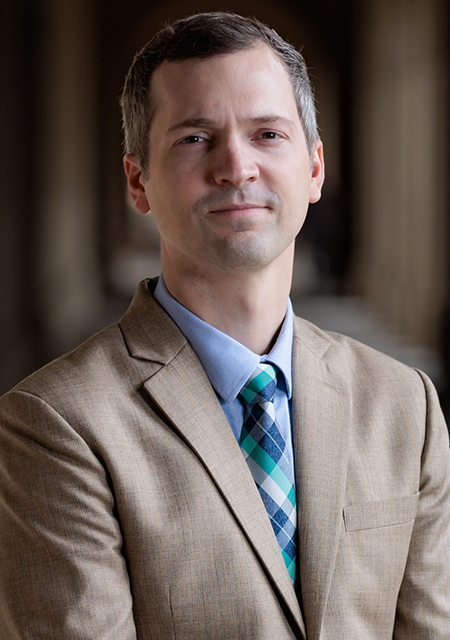Doctor of Philosophy in
Leadership & Human Resource Development
The Leadership & Human Resource Development (LHRD) doctoral program offers a research-oriented, broad-based program of study that can be modified to fit student interests. The program is strongly grounded in leadership, human resource and organization development, and change management theory. The curriculum is focused on foundational and advanced theory and evidence-based practice to ensure relevance in today's challenging organizational environments.
Because human resource, organization and leadership development are applied fields, the goal of the PhD program is to develop highly skilled and innovative researchers and scholar-practitioners. This effectively prepares students for a wide range of careers ranging from academicians at leading educational institutions, professional consultants, human resource and organization development leaders, and other careers in which advanced research, analytical, and organization change capabilities are required. Recent alumni are employed as tenured or tenure-track faculty, organizational change agents, workforce development consultants, and human resource development/training and development directors.
About the LHRD PhD Program
Faculty teaching in the LHRD program have wide and varied research interests including topics such as organizational leadership, multilevel analysis and social network modeling of person-environment interactions in organizations; responses to large-scale organizational change; workforce aging; change reactions to workplace disasters; training effectiveness and learning transfer in the workplace; talent development systems; program monitoring and evaluation; organizational culture and workplace learning; knowledge sharing; instructional technology; colorism and diversity in organizations; and social justice in education across institutional types.
Doctoral training involves close collaboration with faculty members on shared research interests, coursework in human resource development, organization development and change, emotion in organizations, leadership and leadership development, and independent research activities. Students are encouraged to co-design their program of study in consultation with a faculty mentor in ways that are personally meaningful and which optimize student goals. For the dissertation, students collaborate with a faculty mentor to co-design a study that is often groundbreaking and which advances knowledge and science in a particular area of interest.
Partial List of Doctoral Graduate Dissertations
- Self-direction in adult learning: Effect of locus of control and program design on learner motivation and training utility.
- Toward construct validation of the Louisiana School Analysis Model Instructional Staff Questionnaire.
- Construct validation of an Arabic version of the Learning Transfer Systems Inventory for use in Jordan.
- Contributors to an enterprising sex: Examining the influence of creativity on entrepreneurial intentions and the moderating role of political skill controlling for gender.
- Dispositional influences on the intent to transfer learning: A test of a structural equation model.
- Workforce implications for hurricane affected Gulf Coast region industrial companies.
- A test of andragogy in a post-secondary educational setting.
- A theory of effective computer-based instruction for adults.
- Cross-cultural construct validation of the Learning Transfer System Inventory in Taiwan.
- The effectiveness of managerial leadership development programs: A meta-analysis of studies.
- Cognitive complexity, transformational leadership, and organizational outcomes.
- The early identification of business leaders: The development and validation of a leadership potential instrument.
Expectations and Outcomes
In SLHRD, the Ph.D. is a research-based degree. We expect that you will join us with a general sense of one or two big questions that you will want to empirically study. (These should be described in your Personal Statement). It’s very common for students in Ph.D. programs to change the questions they want to explore, but the earlier you have a sense of your focus area, the more you can tailor your experience in SLHRD to ultimately completing your dissertation.
The faculty in SLHRD will help you establish the skills to answer these questions with credible evidence as you develop a deep understanding of Leadership and Human Resource Development. Ninety (90) credit hours beyond the baccalaureate degree are required. Coursework within the degree will be divided into a research block, a leadership & human resource development core, and one or more minors.
Consist of a minimum of 31 semester hours of course work including the dissertation. The exact makeup of this block will be determined by the student and his/her major professor and graduate committee.
The research block will contain coursework in qualitative and quantitative research design, statistical procedures, and interpretation of data.
Consist of a minimum of 36 semester hours of coursework available within the School of Leadership and Human Resource Development. Following the guidelines of the School, the core will be composed of coursework selected to ensure a broad understanding of the field.
May be drawn from a discipline either within or outside of the school. Parameters relative to the minor will be consistent with LSU Graduate School regulations.
Requirements will be determined by the student and his/her graduate advisory committee. The student will work with his/her chairperson to determine recommended coursework. Coursework to remove deficiencies may count as part of the student’s program.
Serious deficiencies may require work that, although necessary, will not be counted towards the degree requirement. All recommendations will be presented to the student’s advisory committee for final approval.
SLHRD faculty expect our students to adhere to the highest ethical and professional standards, such as those set out by the Society for Human Resource Management (review the SHRM Code of Ethics), the Association for Talent Development (review the ATD Code of Ethics) and the American Evaluation Association (review AEA’s Guiding Principles). These codes outline our expectations for professional conduct, ethical behavior, and quality work.
- Achieve a broad understanding of the scholarly literature cross-cutting human resource development, leadership, and organizational development.
- Develop and communicate logical and coherent scholarly arguments through the critique of theory, research, and practice.
- Synthesize ideas and integrate theory, research findings, and practice from past and current publications.
- Demonstrate graduate-level writing skills including the appropriate use of primary and secondary resources, scholarly language, and the logical flow and sequencing of ideas.
- Understand diverse cultural world views and epistemologies and the social justice implications of knowledge, theory and practice.
- Distinguish different research methods and demonstrate foundational knowledge of social science analytics and a depth of knowledge in one or more quantitative or qualitative methods consistent with the student's dissertation research.
- Indicate the strengths and weaknesses of various research strategies and be able to connect various research methods to different research objectives and questions.
- Connect the results of dissertation research to other relevant research and theory.
- Reflect on and develop applied practice skills in light of relevant theory and research.
view the lhrd phd curriculum worksheet
Admissions Criteria
We make every effort to review application materials as quickly as possible. In order to do so, you will need to submit several pieces of information with your application. Failure to submit ALL of the documents listed below in a timely fashion will slow the admission decision.
Students are admitted to the FALL semester only.
- Resume or C.V. with a complete and accurate chronological outline of all previous college-level education and full-time professional work experience
- Three letters of recommendation
- Undergraduate transcripts
- Post-baccalaureate transcripts
- Graduate transcripts
- Personal statement expressing your interest in the program. This document of 1,000
words or less provides the admissions committee with information allowing them to
become more acquainted with you and your interests. Your statement should address
the following questions
- What do you want to study in our PhD program? We see leadership and human resource development as logically connected and mutually supportive areas of study and practice. Both fields have their origins in the social sciences (psychology, sociology), the humanities (ethics, philosophy), and professional and applied fields (organization development, education). Both are multidisciplinary academic fields and both are developmental insofar as they seek to create positive change in people, organizations, and communities. Within this broad sphere of research, theory, and practice where do your interests lie? Why does this make you a good match for our program?
- What are your research interests? Our PhD program offers a research-oriented degree in which the completion of a research-based dissertation is the capstone achievement. Describing your research interests will help our faculty gauge areas of overlap between your interests and theirs. Therefore, please provide a statement of your potential research interests. In doing so, try to situate your research interests within the larger fields of leadership and human resource development, articulate one or more broad questions you are interested in answering, and describe why the question or questions are important.
- How has your past academic or work experience prepared you for conducting scholarly research? Please describe experience you might have with conducting original research or assisting faculty with research projects. Describe any involvement you might have conducting literature reviews and/or writing scholarly papers for publication or conference presentations
An applicant is eligible for regular admission if the applicant meets one of the following Grade Point Average (GPA) requirements:
- The applicant’s cumulative undergraduate GPA or last 60 credit hours from earned bachelor’s degree is at least 3.6.
- The applicant’s cumulative undergraduate GPA or last 60 credit hours from earned bachelor’s degree is between 3.4 to 3.59 and the applicant has earned a graduate GPA of 3.2 or higher in at least nine hours of graduate-level coursework.
With your Doctoral Advisor's approval, up to 12 Graduate credits may transfer with a maximum of 6 credits towards core courses and 6 credits towards electives.
Graduate students may submit requests and may be eligible for prior learning assessments (PLA) or credit for prior learning (CPL) provided the equivalent non-credit experience or training was completed within the last five years.
Alternatively, students may also be eligible for a PLA or CPL if they have remained up to date with their certification through Continuing Education Units (CEUs) that the specific certifying organization mandates.
See the SLHRD Graduate Student Handbook on our SLHRD Graduate Student Resources page for details.
The Graduate Record Exam (GRE) is highly recommended, but not mandatory, for applicants
Deadlines & Dates
Application and supporting materials must be received by the following dates to be considered for admission into the program and/or funding opportunities: SLHRD Graduate Assistantship; Applied Research Consultant (externship).
January 15th - Program Admission & Priority Funding Assessment
March 15th - Program Admission & Funding Assessment
NOTE: Meeting the minimum admission requirements does not ensure acceptance into the program. The compatibility of the applicant’s research interests with those of current faculty is considered when evaluating the applicant. Applicants will be notified of their admission after the March 15 deadline. All applicants must adhere to the application procedures and deadlines established by the LSU Graduate School and the School of Leadership and Human Resource Development.
More Information & Apply
Are you ready to unlock your full potential and make a profound impact in the field of human resource development? If so, we invite you to consider applying to our esteemed Leadership & Human Resource Development Doctoral Program.
Our program is designed to empower and shape the next generation of Changemakers in this dynamic and ever-evolving field. By joining our community of dedicated scholars and practitioners, you will embark on a transformative journey that will propel your career to new heights.

